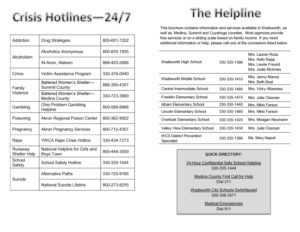 A message from Wadsworth school counselors urges parents to talk with their children about suicide, especially after warnings about the Netflix series 13 Reasons Why. The series, based on a 2007 book by Jay Asher, depicts the story of 17-year-old Hannah Baker, who makes 13 audio tapes before committing suicide. The tapes show events leading up to her death and the decision she made.
A message from Wadsworth school counselors urges parents to talk with their children about suicide, especially after warnings about the Netflix series 13 Reasons Why. The series, based on a 2007 book by Jay Asher, depicts the story of 17-year-old Hannah Baker, who makes 13 audio tapes before committing suicide. The tapes show events leading up to her death and the decision she made.
Experts are worried about the fictitious show inspiring copycat suicides. Below is the letter from Wadsworth counselors along with suicide prevention resources and more for guardians.
—————–
Dear Parent/Guardian(s),
We would like to share information with you on the popular Netflix series, 13 Reasons Why, that is promoted to youth. Nationwide Children’s Hospital Center for Suicide Prevention and Research reached out to school districts this week with their concerns, stating:
“As a hospital system, we have begun to have youth present with increased distress and harmful behavior who have been triggered by this show and its portrayal of suicide. We’ve noticed that students who are already vulnerable to mental health concerns may be at highest risk . . .”
As Netflix is a paid subscription service and not a TV channel, it is not subjected to the same FCC regulations and content rating system as broadcast TV. While the producers are portraying the series as an “important dialogue,” many mental health professionals are cautioning parents about the show as it does not follow best practice for media portrayal of suicide.
Some suggestions in regards to 13 Reasons Why are:
· Decide if you do not want your child to watch the series or watch the series with your child
· Know that it is okay to discuss suicide, as research has proven that it does not cause someone to become suicidal
· Have an open, honest conversation about mental health and suicide and any feelings your child may be having
· Discuss the fictional theatrics versus reality
· As a part of your conversation, encourage your child to reach out to adults if he or she is concerned about a friend, such as the school counselor, a teacher, a trusted adult or a hotline (listed below.)
Discuss with your child to always take warning signs seriously, and never promise to keep them secret. Common signs include:
· Suicide threats, both direct (“I am going to kill myself.” “I need life to stop.”) and indirect (“I need it to stop.” “I wish I could fall asleep and never wake up.”). Threats can be verbal or written, and they are often found in online postings.
· Giving away prized possessions.
· Preoccupation with death in conversation, writing, drawing, and social media.
· Changes in behavior, appearance/hygiene, thoughts, and/or feelings. This can include someone who is typically sad who suddenly becomes extremely happy.
There is help. If you are struggling with thoughts of suicide or know someone who is, talk to a school counselor, trusted adult, call 1-800-273-TALK (8255), or text “START” to 741741.
 A message from Wadsworth school counselors urges parents to talk with their children about suicide, especially after warnings about the Netflix series 13 Reasons Why. The series, based on a 2007 book by Jay Asher, depicts the story of 17-year-old Hannah Baker, who makes 13 audio tapes before committing suicide. The tapes show events leading up to her death and the decision she made.
A message from Wadsworth school counselors urges parents to talk with their children about suicide, especially after warnings about the Netflix series 13 Reasons Why. The series, based on a 2007 book by Jay Asher, depicts the story of 17-year-old Hannah Baker, who makes 13 audio tapes before committing suicide. The tapes show events leading up to her death and the decision she made.


